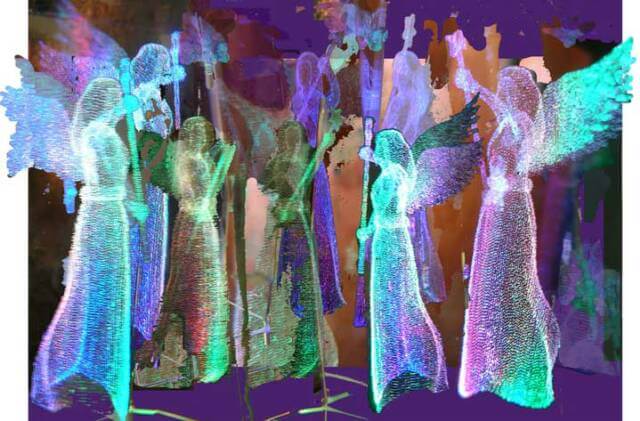
“To the one seated on the throne and to the Lamb
be blessing and honour and glory and might
for ever and ever!”
Revelation 4:11-13
I’ve been having a ball these past few weeks writing about the Songs of The Revelation for our Lenten devotional for 2016. In this I am looking at the Book of The Revelation listening for its music. And it’s been wonderful! Beyond the dragons and beasts of the Apocalypse I am hearing harps, trumpets, and countless choirs making glorious and unending music. God loves music! I am reminded of Martin Luther who said, “Next to the Word of God, music deserves the highest praise.”
As I listen to the music of The Revelation I am reminded of that beautiful scene in The Sound of Music in which Maria is running along a mountainside singing:
The hills are alive with the sound of music
With songs they have sung for a thousand years
The hills fill my heart with the sound of music
My heart wants to sing every song it hears.
What Maria calls “the sound of music” the ancient Greeks and Romans called “The Music of the Spheres”. The Greek philosopher and mathematician Pythagoras linked his theories of mathematics to music, believing that mathematical relationships emit tones of energy and music. The Roman philosopher, Cicero, wrote of a hidden musical universe to which humans have sadly become deaf. In his last book, C. S. Lewis writes sympathetically about the medieval view of the universe in which, “You must conceive of yourself looking at a world lighted, warmed, and resonant with music.” (The Discarded Image: An Introduction to Medieval and Renaissance Literature)
Lewis Thomas, former Dean of Yale Medical School, also hears a world alive with music. In his modern classic, The Lives of a Cell, Thomas calls this “the music of this sphere”. He tells of music made by whales singing, and of termites making percussive sounds to each other by beating their heads against the floor. He has much, much more to say of such music:
Drumming, created by beating the feet, is used by prairie hens, rabbits, and mice…Fish make sounds by clicking their teeth, blowing air, and drumming with special muscles against tuned inflated bladders…Leeches have been heard to tap rhythmically on leaves, engaging the attention of other leeches, which tap back, in synchrony. Even earthworms make sounds, faint staccato notes in regular clusters. Toads sing to each other, and their friends sing back in antiphony…The meadow lark, with three hundred notes to work with, arranges these in phrases of three to six notes and elaborates fifty types of songs.
Thomas concludes that it is not just the animal world that is compelled to make music: “The need to make music, and to listen to it, is universally expressed by human beings.” We ought not be surprised to discover that heaven is filled with music, and we prepare for heaven by making music.
Martin Luther brought about reformation not only in theology but also in music. Luther recovered congregational singing for the church. “Luther was not simply fond of music. Luther thought music has a theological reason for being: it is a gift of God, which comes from the ‘sphere of miraculous audible things’, just like the Word of God.” (Paul Westermeyer, Te Deum: The Church and Music).
Sadly, in my years of theological training and preparation for ministry, I was not offered one course, or, even one class on music. (The psalmists would surely be aghast!) The eminent theologian J. I. Packer writes about the importance of making music and listening to music in our life of faith:
The older I get, the more I want to sing my faith and get others singing it with me. Theology, as I constantly tell my students is for doxology: the first thing to do with it is to turn it into praise and thus honour the God who is its subject, the God in whose presence and by whose help it was worked out. Paul’s summons to sing and make music in one’s heart to the Lord is a word for theologians no less than for other people (Ephesians 5:19). Theologies that cannot be sung (or prayed for that matter) are certainly wrong at a deep level, and such theologies leave me, in both senses, cold: cold-hearted and uninterested. (J. I. Packer, God Has Spoken)
The Bible’s hymnal and prayer book ends with a call for everything and everyone that is breathing to make music to the Lord:
Praise him with trumpet sound;
praise him with lute and harp!
Praise him with tambourine and dance;
praise him with strings and pipe!
Praise him with clanging cymbals;
praise him with loud clashing cymbals!
Let everything that breathes praise the Lord!
Praise the Lord!
Psalm 150:3-6
Grace and peace,
Tim
P.S. Water from Rock’s Advent devotional “And the Word Became Flesh: Daily Reflections on the Incarnation for Advent 2015” is available now. Order copies for yourself, your family and friends, study group, Sunday School class, church, etc., by using our order form.



